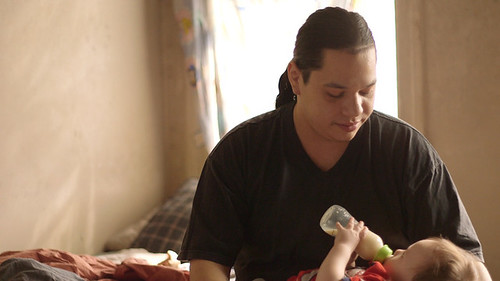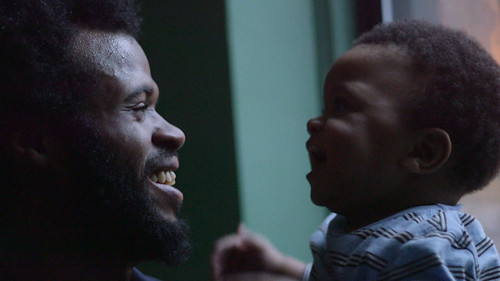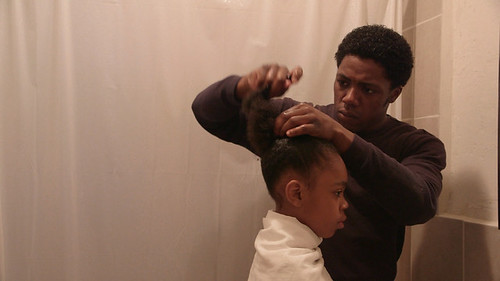GGC: At what point did you know you had to make this film? What do you hope to accomplish with Daddy Don't Go?
Emily: In making my previous social-issue documentaries, I ran into a lot of low-to-no income dads who I felt were getting a bad rap - the deadbeat dad stereotype certainly did not fit them. And in living in NYC for the past 20 years, you see these young dads in their hoodies and baggie jeans all the time - pushing strollers, doing homework with their kids on the subway, etc. I always had a soft spot for these dads but I also felt a deep empathy for children growing up without their fathers since that was my own dad's story. So the film is really made to inspire men who are what I refer to as "at-risk" dads. The subjects in "Daddy Don't Go" show that you don't have to be a perfect man to be a great father. More importantly, the film is really an homage to all the young fathers in NYC who are doing the right thing for their kids, against the odds. And the odds are real: Children who grow up without active fathers in their lives are more likely to live in poverty, do poorly in school, run afoul of the criminal justice system, and become teenage parents. This is particularly true for New York City’s African American and Latino children, who are more likely to grow up in single-parent households. While 32 percent of all New York City children under the age of 17 live in households without a father, 54 percent of black and 43 percent of Latino children grow up in fatherless households.
GGC: Can you tell me a little bit about the dads you feature in this doc?
Emily: Alex, 26, is a single father who lives with his toddler son in a Harlem shelter. Alex fought to keep his child out of the foster care system but now faces a new challenge to his family's well-being: possible jail time. Nelson, 26, is a Latin King and full time father to his toddler son and two girls from his partner’s previous relationships. Money and housing issues threaten the family’s stability but Nelson perseveres. Roy, 28, is an ex-offender who finds a second chance in his son’s loving arms. When a construction accident leaves him permanently disabled, Roy must move in with his parents and find a new way to support his family. Omar, 36, is a single father who rescued his children from their abusive mother but now fights in court to maintain custody of his three troubled kids.
GGC: How did you all meet?
Emily: When we were looking for our dads, we canvassed the city's father-friendly programs and organizations to find stories that fit certain demographics and specific storylines we wanted to represent. One organization was hugely helpful in this search but unfortunately I am not at liberty to name them at this time.
GGC: How, if at all, has fatherhood changed these men?
Emily: What all of the dads in our film have in common is that they all say fatherhood has made them better men and that their children are the best thing that's happened to them.
GGC: How (if at all) have those stories changed since you started filming?
Emily: It has truly been a roller-coaster ride... One of our dads is now facing jail time. This is truly harrowing because it means he would be separated from his toddler son of whom he has sole custody.
GGC: What is a typical day in the life of one of these men?
Emily: These dads are the primary care-takers for their children so that's where the majority of their time goes. Also, all of our dads receive some sort of public assistance so they often have appointments related to that. They also work temporary jobs when they can.
GGC: Has this process caused you to look at your father differently? Fathers in general? Men?
Emily: I was very much moved to make "Daddy Don’t Go" on a personal level. The film is an homage to every urban father I've ever known who negated the “deadbeat dad” stereotype with a deep love for his children. These men, much like my own father, are trying to be the dads they never themselves had. As a fellow parent, their efforts move me greatly. The film was also inspired by the many fathers in my community who, like my own husband, share parenting duties equally with their partners. This new norm has convinced me that fatherhood is a topic of enormous social value at this time. What we are finding in making the film is that our fathers' stories represent that of millions of other men across America. It's been so exciting to connect with the huge social media community that has organized itself around the theme of fatherhood. There is a powerful social movement under way and the definition of a "good dad" is completely changing. More men than ever are the primary care-takers for their children. More men than ever are fighting for custody of their children. More men than ever are saying "being a father is the most important thing in my life" and stepping up accordingly.
GGC: Anything you'd like to add?
Emily: The negative lens through which urban fathers are currently viewed is only going to be undone by work from many angles – political, legal, media, etc. I want to contribute to this effort by bringing new, and positive, images of urban fatherhood to a national audience. "Daddy Don’t Go" will be part of a social movement that believes the most revolutionary thing a father can do is take care of his children.
To find out more/donate to Daddy Don't Go's Kickstarter page go here. Thank you in advance.
GGC






0 comments:
Post a Comment